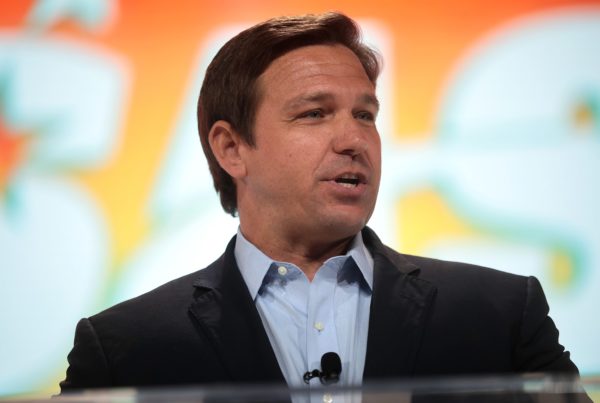Last week’s senate hearing, in which a whistleblower who calls himself “Mudge” told lawmakers about lax data security at Twitter, was just the latest indication that Congress is getting more serious about federal privacy legislation. Support for curbs on tech companies’ power has come from both sides of the aisle.
House Speaker Nancy Pelosi, who represents San Francisco, the home of many a tech giant, has been among those attempting to slow new regulations, and it’s unclear how Texans, like Sen. Ted Cruz, who could play a key role in negotiations, regard the legislation. Ben Brody has been covering this story for Protocol, where he is a senior reporter. He told Texas Standard that concepts like data minimization – keeping companies from gathering data about usage unrelated to their own products – have a lot of support on Capitol Hill. Other questions, like just how much power tech companies would continue to have to regulate speech on their platforms, are more controversial. Listen to the interview above or read the transcript below.
This transcript has been edited lightly for clarity:
Texas Standard: Pelosi’s San Francisco connection is kind of crucial here, it would seem to me.
Ben Brody: Yeah, I think that’s true. The speaker is zeroing in particularly on this bipartisan privacy legislation that we have, moving especially through the House, but at least exists theoretically in the Senate. One of the reasons that that’s bipartisan is Democrats were able to attract Republicans on board by saying they would overrule state privacy statutes and state privacy rules. California is, of course, very proud of its privacy rules. And so Speaker Pelosi is very much worried about what this legislation would do to her state. And so that’s a place where she’s really clashing with the White House.
Let’s talk a little bit more about the terminology here. Federal privacy legislation – what’s meant by privacy, and what kinds of new rules do advocates envision?
Yeah, that’s a great question. I think some of the things in this bill that we’re looking at are what your listeners might be used to, ever since California and Europe passed their privacy rules. And so you get those popups that say, ‘you have the right to access, you have the right to correct your data, you have the right to delete your data, you have the right to opt out of sale of your data.’ That’s sort of become the core of every privacy framework that we are dealing with all over the world.
What this bill would do is bring a whole bunch of other things. The big innovation is something called data minimization. So if you are a music streaming web site, you don’t need to know what kind of shoes I like to buy or where I live. And data minimization basically says, ‘hey, web sites, we know you want to collect that so that you can advertise more easily to these listeners. But that’s not the minimum amount of data that you need. And so you should really minimize.’
Well, how do you define what they need? Because there are a lot of businesses that are built on selling that data through the back door. And of course, I think a lot of businesses would say this is part of our business model. Yeah, we need this. This is what is how we make money.
Absolutely. I think one of the innovations is that it is the core service. It’s not your business model. It’s sort of what the consumer thinks that they’re getting from you. But I think your broader question is exactly right. And even if this were to go into law, I think we would see years, if not decades of rulemaking at the FTC, court decisions and follow on legislation that would be trying to address exactly that.
We were talking about how California has its own rules and Speaker Pelosi sort of wanting to slow things down on any changes on that front. But we’re talking about politicians in California. And you have Silicon Valley just around the corner from San Francisco. Are they primarily looking out for the tech companies in Silicon Valley that want to continue to make money on the sale of data?
You know, I think there are people who would say that is what the speaker is really trying to do here. Certainly, when I talk to industry lobbyists, they frankly hate California’s rules and they would love to see a federal framework, even if it’s actually sort of more punitive. But if it overruled California, they would really love to see that. I think that there are a lot of things about California that are just very difficult for them to deal with. And so the question of exactly what the speaker is trying to do here is a little bit unclear. But certainly, I think that the federal framework is something that most of these companies would actually prefer.
Is there any light between what the Biden administration wants to see and what Congress seems to be most seriously considering?
As far as we know, the Biden administration is sort of staying out of this. They weighed in about two weeks ago and they said, ‘look, we’re really encouraged by the bipartisan talks here. We hope they continue and we hope that they pass something.’ They did not weigh in and say, data minimization has to look this way and not that way. Or another provision in the law would be annual civil rights assessment for algorithms. They didn’t say, ‘oh, we want that to be stronger. We want that to be weaker.’ So they’re trying to, I think, urge the politics along. And I’m sure behind the scenes they’re a little bit more involved. But I think right now they are at least deferring to the legislators.
Since we’re focusing on the politics, is it right that if Republicans take the Senate in November, Texas Sen. Ted Cruz could play an important role in how and whether privacy rules move forward? Say more about that and what Cruz has had to say about these bills.
Yeah, exactly. That’s a great thing to keep in mind. So right now, the lead negotiators are the top Democrats and the top Republicans on the House and Senate Commerce Committee – it’s called something different in the House. But on the Senate side, that’s Sen. Roger Wicker. Wicker, however, is leaving committee leadership. Everybody thinks the top Republican will be Sen. Cruz, which would make him either the number two negotiator on that committee behind a Democratic chair or, if the polling is wrong, as it has been many election cycles and the Republicans actually take the Senate, it would make him the lead Senate negotiator, if not the most important negotiator. What he thinks about all this is a big question mark, and we don’t necessarily know. He certainly has taken some very anti-tech positions over the last couple of years. He likes to beat up on the platforms, but that’s mostly about what he calls conservative bias. Where he stands on the privacy questions and what he would think about doing to the rest of the industry beyond big tech, it’s a big open question.
What do you see happening next? Do you think this privacy legislation is going to get a vote during this session of Congress?
It’s always really hard to predict that. I tend to take the line that compromise is difficult in Washington. We all know how fraught things are here, and it’s always easy to kind of bet against things. That being said, I’ve been betting against things for years and it’s been a very productive last couple of months in Congress. And so you never know. Maybe they’ll show me up.















